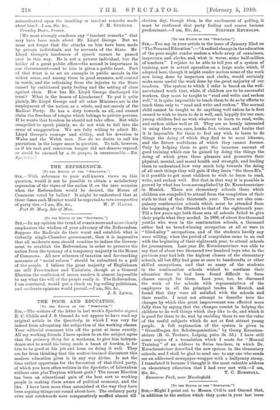rTo THE EDITOR Or THY " SPacTAT0R.1 SIR,—You say in
your article in the issue of January 22nd on "The Poor andEducation":—"A radical change in the education of the poor might render useless a whole army of examiners, inspectors, and clerks, and, what is worse, some half-million of teachers." I rejoice to be able to tell you of a system of training, now in actual operation on a large scale, which, if adopted here, though it might render useless some of the work now being done by inspectors and clerks, would certainly make more useful the work done by the great majority of our teachers. The system to which I refer is based on the well- ascertained truth that, while, if children are to be successful workers, they must be taught to "read and write and reckon well," it is quite impossible to teach them to do so by efforts to teach them only to "read and write and reckon." The normal child cannot be taught to do anything well unless he is first caused to wish to learn to do it well, and, happily for our race, young children feel no wish whatever to learn to read, write, and reckon either well or ill. They are so keenly interested in using their eyes, ears, hands, feet, voices, and brains that it is impossible for them to feel any wish to learn to do things the doing of which they find to be most irksome, and the future usefulness of which they cannot foresee. Only by helping them to gain the immense amount of good training which can be gained by doing the things the doing of which gives them pleasure and promotes their physical, mental, and moral health and strength, and leading them to understand how very much help towards the doing of all such things they will gain if they learn "the three R's," is it possible to get most children to wish to learn to read, write, and reckon well. But that in that way it is possible is proved by what has been accomplished by Dr. Kerschensteiner in Munich. There are elementary schools there which children are compelled to attend from the completion of their sixth to that of their thirteenth year. There are also com- pulsory continuation schools which must be attended from the beginning of the fifteenth to that of the eighteenth year. Till a few years ago both these sets of schools failed to give their pupils what they needed. In 1896, of about five thousand youths who were in the continuation schools, a thousand either had no bread-winning occupation at all or were in " blind-alley " occupations, and of the students hardly any were willing, when the period of compulsion came to an end with the beginning of their eighteenth year, to attend schools for journeymen. Last year Dr. Kerschensteiner was able to say that of about two thousand two hundred boys who in the previous year had left the highest classes of the elementary schools, all but fifty had gone at once to handicrafts or other skilled occupations, and that so many of the students in the continuation schools wished to continue their education that it had been found difficult to form classes enough for them. Last year, too, he discussed the work of the schools with representatives of the employers in all the principal trades in Munich, and found that they were all satisfied with the schools and their results. I must not attempt to describe here the changes by which this great improvement was effected more fully than by saying that the changes consist in helping the children to do well things which they like to do, and which it is good for them to do, and by enabling them to see the value of the useful subjects which do not at first attract young people. A full explanation of the system is given in " Grundfragen der Schrdorganisation," by Georg Kerschen- steiner (B. G. Teubner, Leipzig, price 3s. 3d.) I have still some copies of a translation which I made for "Manual Training" of an address to Swiss teachers, in which Dr. Kerschensteiner described the new system in the elementary schools, and I shall be glad to send one to any one who sends me an addressed newspaper-wrapper with a halfpenny stamp. I translated it because I thought it the most valuable address on elementary education that I had ever met with.—I am, Sir, &c., T. C. RORSPALL. Swanscoe Park, near Macclesfield.










































 Previous page
Previous page